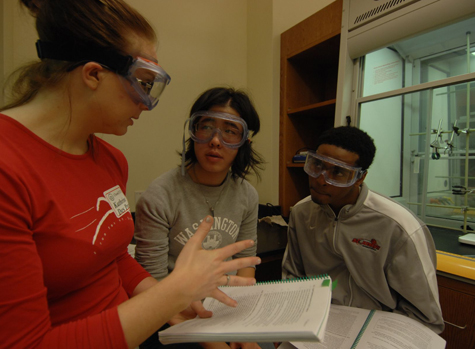
teaching assistant in chemistry, works with freshmen Joanna Luo (middle)
and Zarion Marshall during a lab. (Credit: Joe Angeles)
Giving up a career with NASA and other prestigious clients mid-career to become a doctor made absolute sense to Andy Beck.
The former San Francisco health-care consultant to the space agency, Federal Emergency Management Agency and other organizations put his flourishing career on hold to enroll in the post-baccalaureate pre-medical program at University College in Arts & Sciences. He joined 90 other students in the two-year certificate program.
Enrollment has increased dramatically since the program began in 2001 with eight students; it is nearly at capacity, says Elizabeth Fogt, director of advising and student services in UCollege. The growth tripled from 2008, when it became a graduate-level program.
Students, whose average age is 24 (although some are in their 40s), opt to return to college for a variety of reasons: poor economy, a newfound desire to help people, career dissatisfaction, an effort to improve on undergrad performance, among others, she says.
“Many folks are leaving jobs across the country to come to our program,” Fogt says. “Some have been in the Peace Corps, others in AmeriCorps, but a big group just wants to do service.”
That was the case for Beck, who earned an undergraduate degree in accounting with a minor in computer science, and then a master’s degree in finance. While working on a computer system to project the logistics and costs of Hurricane Katrina recovery for FEMA, Beck worked with health-care providers. Their work intrigued him and that interest was fanned brighter when, as an outside consultant, he puzzled out how to lower hospital readmission rates at a San Francisco-area hospital.
“I wanted to contribute to something more than just receiving a salary. I realized how much I really liked working with patients. I was absolutely certain then that health care was what I wanted to be involved in for the rest of my life,” Beck says.
He finished the UCollege program this year and applied to 20 medical schools. He has had interviews with 17 and been accepted at four. He believes the UCollege program has paid dividends already in how many interviews he was invited to.
“I wanted the most rigorous pre-medical education I could get and Washington University was the best place to make that happen. The overall value was what made a big difference,” Beck says.
Depending on previous coursework, students can finish the program in as little as one year, Fogt says. The cost of the full two years is just over $24,000. Financial aid and scholarships are also available.
“We are very competitive,” she says. “To be able to come to a university of this caliber in a city with such rich biomedical network is a large advantage.”
Entering student Kevin Lyons, formerly of Lena, Ill., gave up his career as an actuary for a large insurance company in Connecticut to enroll in WUSTL’s program. The personalized attention from Fogt and adviser Shawn Cummings plus the university’s reputation were deciding factors for Lyons.
“I didn’t feel fulfilled at work. I thought ‘I’m not getting any younger, and I want to do this now,’” says Lyons, 29.
About half of the students are career-changers, and the others are recent bachelor’s degree graduates who want to improve their grades or acquire necessary classes for medical school applications. Katie DesPrez, who is in her second year of the program, didn’t seriously consider medicine as an undergraduate American studies and Spanish major at Vanderbilt University because a chemistry class didn’t go well for her.
“Both my parents are doctors but I didn’t think about it until I was junior and by then it was too late,” the Tulsa, Okla., native says.
It was during a trip to Argentina when she had time to reflect that DesPrez decided medicine was really her life’s mission. Now she’s taking the science and math classes she needs to apply to medical school.
Students say one of the reasons they chose the UCollege program from among 135 nationally is the rigor of the program and the personal attention they get from advisers.
“We talk to them multiple times before they apply,” Fogt says.
“We help them assess what coursework they need to take and map out a timeline. Once here, we meet with them regularly.
“When it’s time for them to apply to medical schools, we meet with them in the spring before summer application season starts and we work with them about interviews and application letters.”
Students have gone on to a wide variety of medical schools including the prestigious Johns Hopkins University, Case Western Reserve, University of Pennsylvania and about 50 others.
Another big draw to the program is its flexibility, Fogt says. Students can take all of their courses at night, giving them the option to work during the day. They also have more choices on which courses to take.
“The students make the choices, where other programs set the curriculum,” she says.
Another strength is the students’ camaraderie.
“We have a really good community among the students. It’s very supportive: they tutor each other, attend social events and some have a Friday night ‘family dinner,’” Fogt says. “They really connect and support each other.”